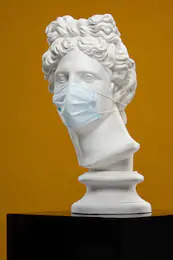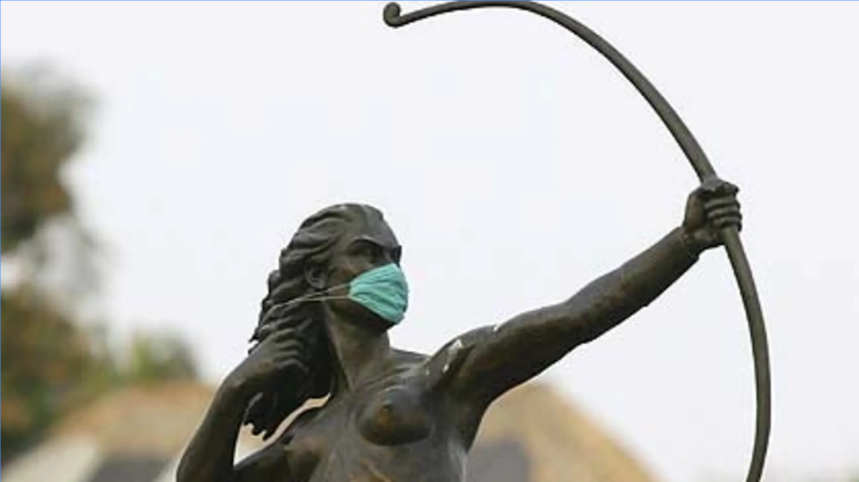Reflection by Michiel Meeusen
Michiel Meeusen received his PhD in Literature from KU Leuven in 2013. He specialises in ancient science and medicine and the literature and culture of the High Roman Empire (Orcid).
Western literature starts with a disease. At the beginning of the Iliad, Homer sings of an “evil pestilence” sent by the Olympic god Apollo to devastate the camp of the Greeks during their siege of Troy. Apollo, the god of medicine and healing (among other specialisms), could bring ill health and deadly plague with his arrows too. It is this darker side that the Greeks get to face: “his coming was like the night”.

Agamemnon’s decision to appease the angry god (by restitution of his personal booty Chryseis to the Trojans) does not come one minute too late, since – pardon Homer’s vividness – “constantly the pyres of the dead burned thick”. Homer’s lines suggest just how raw reality could be back then. “The men began to die one after the other, and the shafts of the god ranged everywhere throughout the wide camp of the Achaeans”. In case of divine punishment, there was always plenty of space for collateral drama in antiquity.
But considering the relatively deplorable state of ancient medical healthcare in general and the obvious absence of knowledge relating to microbial organisms in specific (including bacteria and viruses, invisible to the naked eye) Homer’s plague is probably not ‘pure poetry’. Read Thucydides if you dare. His account of the plague of Athens is much more prosaic no doubt, but no less horrific. Striking in the second year of the Peloponnesian War (430 BCE), the plague is estimated to have killed 75-100k people. 25k people margin. Go figure.
For “a kind of sickness which far surmounted all expression of words,” Thucydides’ description seems more verbose than strictly needed. But we should give him credit for offering a first-hand account of the epidemic. “Having been both sick of it myself and seen others sick of the same,” Thucydides is writing his memoirs to help the reader identify the sickness “if it come again.” And, yes, he does raise some helpful points even for us now. Consider, for instance, the interesting detail that some people herded together like sheep and thus became “infected by mutual visitation, for the greatest mortality proceeded that way.” If only the Athenians had known that social distancing saves lives. …

Here are some other sad highlights: Doctors were unable to cure the disease as they lacked any knowledge about it. Worse, they were the ones who died first because they came in touch with the sick most. Dead bodies were lying unburied in the streets, and the birds and dogs that used to feed on human flesh either did not taste the corpses or died afterwards. Chaos ruled the city. The temples were all full of the dead too (anyway, the gods had left). Thucydides’ graphic description of the plague’s devastating impact on the human body leaves little to the imagination. Some people went (and stayed) completely mental but survived physically.
Ok. Now relax.
COVID-19 is not the plague, nor do we live in a world governed by the rules of ancient Greek drama (although we do get to wear fancy masks!). We do not hear the “terrible twang of Apollo’s silver bow” each time our news feeds break daily fresh infection rates. With unprecedented speed, our scientists race to develop a vaccine. True, “the sky is clearing, spring is coming” (Richard Hendrick, Lockdown). Birds are building their nests, and all that. But there’s no reason to cheer quite yet.
Just as beauty is in the eye of the beholder, so too is plausibility. We use narrative to make sense of the world we inhabit. Stories serve as a powerful antidote against the garbage which reality so often has in store for us. Some stories are more plausible than others, for sure. Think of the one about a secret laboratory experiment gone wrong, or the one that explains the virus as the product of natural evolution. Pick and choose!
To tell a different story: in his Table Talk, Plutarch of Chaeronea discusses whether new diseases can come into being, and, if so, from what causes. We are at a symposium, where men of culture used to drink and socialise. Yes, my boy, that was a thing once! In summary, the party agrees that new diseases do indeed come into existence. As to the why, Plutarch concludes that they are probably caused by the luxurious life-style endemic to his time (the ‘globalized’ High Roman Empire):
“the change in our way of life (‘diet’/diaita), right here on earth, is capable of creating new diseases and making old ones vanish.”
Moralizing at a party is a bold move. Less to fear in times of social distancing, I hope, so let’s give it a shot. I’m no hero at this, but I am inclined to side with the climate change people, who at least have the guts to put A and B together. If we do not change our own ‘luxurious lifestyle’ (fill in adlib), expect more of this fun in the future. It’s one way to turn this pandemic into something meaningful.
Whatever the case may be, nous sommes en guerre! As time passes, this self-quarantining ‘diet’ will make some of us war-wearied, sick of fighting the invisible enemy only to flatten the irksome curve. Just keep in mind that the true heroes in this story are not we but our doctors, nurses, virologists, epidemiologists, the modern heirs of Apollo the Healer, Asclepius, Hygieia and Panacea (to name only those healing gods whom the Hippocratics solemnly swore their Oath to). They are our society’s medical infantry bravely taking the blows at the viral frontline. Take it from a blind old Greek: “A physician is worth many other people.”
But that’s only half of the story. The catalogue of heroes is much more inclusive. What about our cashiers, our bakers, our butchers, our dustmen, our postmen, our policemen, our bus drivers, our dockworkers? Impossible to be exhaustive here, but you get the picture. These are the people that keep things running smoothly. No Homeric quotes for them. But a nice, warm hug from the ivory tower nevertheless.
A Platonic hug, for now.